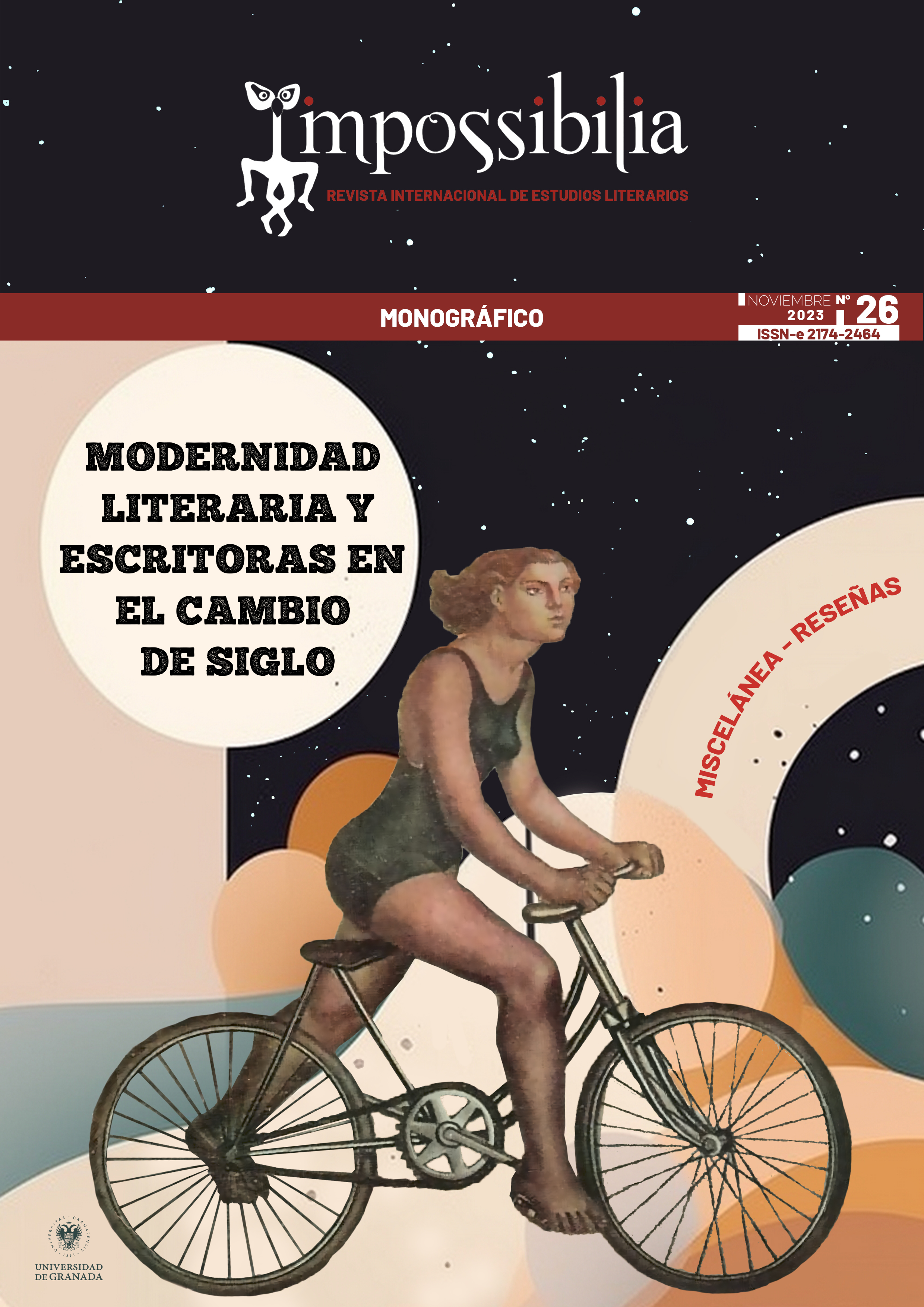Notas sueltas sobre el “apropiacionismo crítico” de Javier García Rodríguez
DOI:
https://doi.org/10.30827/impossibilia.262023.29386Palabras clave:
teoría literaria, apropiacionismo, teoría de la ficción, humor, extrañamiento, Javier García RodríguezResumen
Este artículo ahonda en la propuesta apropiacionista del teórico de la literatura y escritor Javier García Rodríguez. El apropiacionismo nos anima a repensar nociones centrales en los estudios literarios, como la de canon, originalidad o intención autorial. En su aplicación al género académico, hace evidente la compleja red de convenciones sobre la que construimos el conocimiento humanístico. Así, mediante el humor y el extrañamiento, la obra de García Rodríguez pone en cuestión los métodos clásicos de la investigación universitaria y sugiere nuevos caminos, entre lo literario y lo crítico, para renovar el modo en que teorizamos sobre la ficción.
Descargas
Citas
APARICIO MAYDEU, Javier. (2013). Continuidad y ruptura. Una gramática de la tradición contemporánea. Madrid: Alianza.
BARTHES, Roland. (1994a). De la obra al texto. En El susurro del lenguaje. Más allá de la palabra y de la escritura (73-82). Barcelona: Paidós.
BARTHES, Roland. (1994b). La extranjera. En El susurro del lenguaje. Más allá de la palabra y de la escritura (211-214). Barcelona: Paidós.
BOURDIEU, Pierre. (2010). Sociología de la percepción estética. En BOURDIEU, Pierre. El sentido social del gusto. Elementos para una sociología de la cultura (65-84). Buenos Aires: Siglo XXI.
CALLES HIDALGO, Jara. (2018). Literatura con paradiña. EU-topías. Revista de Interculturalidad, Comunicación y Estudios Europeos, (15), 179-183.
CUSSEN, Felipe. (2013). Versos sueltos, lugares comunes, poemas encontrados. Acta Literaria, (46), 9-19.
DELEUZE, Gilles; & GUATTARI, Félix. (2002). Mil mesetas. Capitalismo y esquizofrenia. Valencia: Pre-Textos.
DEL RÍO CASTAÑEDA, Laro. (2017). Entre mutantes y académicos: la criticaficción de García Rodríguez. Actio Nova: Revista de Teoría de la Literatura y Literatura Comparada, (1), 268-272.
FERNÁNDEZ MALLO, Agustín. (2020). Teoría general de la basura (cultura, apropiación, complejidad). Barcelona: Galaxia Gutenberg.
GARCÍA RODRÍGUEZ, Javier. (2009). Mutatis mutandis: hacia una hermenéutica transficcional de las narrativas mutantes: de Propp al afterpop (o «nocilla, qué merendilla»). Zaragoza: Eclipsados.
GARCÍA RODRÍGUEZ, Javier. (2016). LYRICA® (patología y tratamiento). Actio Nova: Revista de Teoría de la Literatura y Literatura Comparada, (0), 110-120.
GARCÍA RODRÍGUEZ, Javier. (2017a). Literatura con paradiña. Hacia una lógica de la razón crítica. Salamanca: Delirio.
GARCÍA RODRÍGUEZ, Javier. (2017b). En realidad ficciones. Oviedo: Septem.
GARCÍA RODRÍGUEZ, Javier. (2020). Intersecciones: la lógica de los posibles teóricos. En GARCÍA RODRÍGUEZ, Javier (ed.). Intersecciones. Relaciones de la Literatura y la Teoría (9-25). Oviedo: Servicio de Publicaciones de la Universidad de Oviedo.
GARCÍA RODRÍGUEZ, Javier. (2022a). La belleza de la violencia. En GARCÍA RODRÍGUEZ, Javier. Andarse por las tramas. Literatura y series de televisión (69-73). León: Eolas y menoslobos.
GARCÍA RODRÍGUEZ, Javier. (2022b). Fragmento mori: la parte por el todo y la (posible) falacia de la continuidad narrativa. En GÓMEZ TRUEBA, Teresa; & VENZON, Ruben (eds.). Grietas. Estudios sobre fragmentarismo y narrativa contemporánea (337-353). Berlín: Peter Lang.
GÓMEZ TRUEBA, Teresa. (2018). Collage, trash art o ready made: la práctica del apropiacionismo en el relato mutante del siglo XXI. En MOZO MARTÍN, Borja; Sorina SIMION, Dora; & STANCU, Melani (eds.). Narrativas mutantes: anomalía viral en los genes de la ficción (113-126). Bucarest: Ars Docendi.
GRICE, H. P. (1975). Logic and Conversation. En Peter Cole & Jerry Morgan (eds.). Syntax and Semantics 3: Speech Acts (41-58). Nueva York: New York Academic Press.
GROYS, Boris. (2016). Arte en flujo. Ensayos sobre la evanescencia del presente. Buenos Aires: Caja Negra.
GUTIÉRREZ VALENCIA, Cristina. (2018). Javier García Rodríguez, un homo sampler con estilete crítico. El Cuaderno. En línea: https://elcuadernodigital.com/2018/01/05/en-realidad-ficciones/. [Última consulta: 7 de noviembre de 2023.]
GUTIÉRREZ VALENCIA, Cristina (en prensa). Margin-alt: el ethos periférico y los márgenes a propósito de Javier García Rodríguez. Esferas Literarias, (6).
ISER, Wolfgang. (1987). El acto de leer. Teoría del efecto estético. Madrid: Taurus.
LORENZO, Guillermo. (2022). De la música minúscula. León: Eolas y menoslobos.
MARTÍN PRADA, Juan. (2001). La apropiación posmoderna. Arte, práctica apropiacionista y teoría de la posmodernidad. Madrid: Fundamentos.
MCLAUGHING, Thomas. (1997). Street Smarts and Critical Theory. Listening to the Vernacular. Madison: The University of Wisconsin Press.
MORA, Vicente Luis. (2018). Crítica creativa. Diario de lecturas (22 de julio). En línea: http://vicenteluismora.blogspot.com/2018/07/la-critica-creativa.html. [Última consulta: 7 de noviembre de 2023.]
RODRÍGUEZ POSADA. Adolfo. (2021). No-literatura: aproximación a la ontología débil de la literatura después del fragmentarismo. Rilce, 37(3), 1173-1203.
SÁNCHEZ UNGIDOS, Guillermo. (2021). “Fricciones académicas”. La permeabilidad de la ficción (o de la teoría) en la escritura de Javier García Rodríguez. Castilla, (12), 1-28.
SHKLOVSKI, VIKTOR. (1992). Carta a Tynianov. En VOLEK, Emil (ed.). Antología del Formalismo Ruso y el Grupo de Bajtin. Volumen I: Polémica, historia y teoría literaria (59-61). Madrid: Fundamentos.
Publicado
Cómo citar
Número
Sección
Licencia
Derechos de autor 2023 Impossibilia. Revista Internacional de Estudios Literarios

Esta obra está bajo una licencia internacional Creative Commons Atribución-NoComercial-SinDerivadas 4.0.















